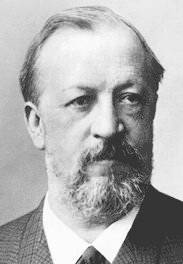
FAQ About Nikolaus August Otto

Who was Nikolaus August Otto?
Nikolaus August Otto was a German engineer and inventor born on June 14, 1832. He is best known for developing the compressed charge internal combustion engine, which laid the groundwork for the modern engines used in today's automobiles and industrial machinery.

What is Nikolaus August Otto famous for?
Nikolaus August Otto is most famous for inventing the first successful and practical compressed charge internal combustion engine. This invention significantly influenced the development of the modern automobile and is often referred to as the "Otto engine."

When did Nikolaus August Otto invent the internal combustion engine?
Otto developed his version of the internal combustion engine in 1861 and refined it over several years. The most significant breakthrough came in 1876 when he successfully created a four-stroke engine cycle, known as the Otto cycle, which is still used today in most internal combustion engines.

What is the Otto cycle?
The Otto cycle is a thermodynamic cycle that describes the functioning of a typical four-stroke internal combustion engine. It involves four stages: intake, compression, power (combustion), and exhaust. This cycle is essential for converting fuel into mechanical energy in most gasoline-powered vehicles.

How did Otto's invention impact the transportation industry?
Otto's invention revolutionized the transportation industry by making it possible to create a reliable, efficient, and compact engine that could power vehicles. This led to the development and proliferation of automobiles, ultimately transforming how goods and people move around the world.

Did Nikolaus August Otto receive any awards for his work?
While Nikolaus August Otto did not receive many formal awards during his lifetime, his work received widespread recognition posthumously. His inventions have been credited with catalyzing monumental changes in industrial technology, and his contributions are still celebrated in engineering and historical contexts.

Where was Nikolaus August Otto born?
Nikolaus August Otto was born in Holzhausen an der Haide, part of the Duchy of Nassau in what is now modern-day Germany.

Why is the Otto engine significant in engineering history?
The Otto engine is significant because it was the first practical internal combustion engine that operated efficiently and reliably. This engine paved the way for the mass production of automobiles and marked the beginning of the mechanized vehicle era.

What industries benefited from Otto's engine besides transportation?
Besides the transportation industry, Otto's engine significantly impacted various other sectors including agriculture (with the development of tractors), manufacturing (through mechanization and automation processes), and power generation (with the engines used in factories and for electricity generation).

How does the Otto engine differ from a diesel engine?
The primary difference between an Otto engine and a diesel engine lies in their combustion processes. An Otto engine uses spark ignition to ignite the air-fuel mixture, whereas a diesel engine uses compression ignition where the air-fuel mixture ignites due to high pressure and temperature.

What are some common misconceptions about Nikolaus August Otto?
A common misconception about Nikolaus August Otto is that he invented the very first internal combustion engine. In reality, other versions existed before his, but Otto was the first to make a practical and commercially successful model. Additionally, some people mistakenly attribute the creation of diesel engines to Otto, although they were developed later by Rudolf Diesel.

What materials were used in Nikolaus August Otto's engines?
The original Otto engines were constructed using cast iron for the engine block and cylinder head due to its durability and heat-resistant properties. Other components were made from steel and other metals that could withstand the pressures and temperatures generated during combustion.

Did Nikolaus August Otto have any business partnerships?
Yes, Nikolaus August Otto co-founded a company with Eugen Langen in 1864, which became known as N.A. Otto & Cie. This company was instrumental in developing and manufacturing Otto's engines, eventually becoming part of the larger conglomerate known today as Deutz AG.

What challenges did Otto face in developing his engine?
Otto faced numerous challenges, including technical difficulties in achieving reliable ignition and efficient fuel consumption. Additionally, he had to contend with patent disputes and financial constraints as he worked to improve and commercialize his engine innovations.

How did Nikolaus August Otto's inventions influence modern engineering?
Otto's inventions had a profound influence on modern engineering by establishing key principles in engine design that are still in use today. His work laid the foundation for advancements in automotive engineering, power systems, and various fields that rely on engine technology.

What education did Nikolaus August Otto have?
Nikolaus August Otto did not have a formal engineering education; he was largely self-taught. His education was primarily through practical experience and experimentation, which allowed him to develop his ideas and innovations organically.

Are any of Otto's original engines still in existence?
Yes, some of Otto's original engines are preserved in museums and collections around the world. These engines are valuable historical artifacts that showcase the ingenuity and craftsmanship of the early internal combustion engine era.

What was the first application of Otto's engine?
The first successful application of Otto's engine was in stationary applications such as pumping water and powering industrial machinery. It was not until later developments that the engine was adapted for use in automobiles.

How did Otto's invention impact environmental considerations?
Nikolaus August Otto's invention, while revolutionary, also marked the beginning of industrial carbon emissions due to the widespread use of combustion engines. Although at the time, the environmental impact was not well understood, his engines set the stage for modern discussions on fossil fuels and air pollution.

What is the legacy of Nikolaus August Otto today?
The legacy of Nikolaus August Otto is immense, as he is considered one of the pioneers of the internal combustion engine, a vital technological development that powered the 20th century and continues to be a cornerstone of global industry and transportation.
